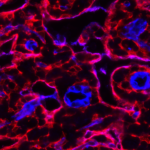Lien vers Pubmed [PMID] – 26160380
Science 2015 Aug;349(6251):989-93
Changes to the symbiotic microbiota early in life, or the absence of it, can lead to exacerbated type 2 immunity and allergic inflammations. Although it is unclear how the microbiota regulates type 2 immunity, it is a strong inducer of proinflammatory T helper 17 (T(H)17) cells and regulatory T cells (T(regs)) in the intestine. Here, we report that microbiota-induced T(regs) express the nuclear hormone receptor RORγt and differentiate along a pathway that also leads to T(H)17 cells. In the absence of RORγt(+) T(regs), T(H)2-driven defense against helminths is more efficient, whereas T(H)2-associated pathology is exacerbated. Thus, the microbiota regulates type 2 responses through the induction of type 3 RORγt(+) T(regs) and T(H)17 cells and acts as a key factor in balancing immune responses at mucosal surfaces.





